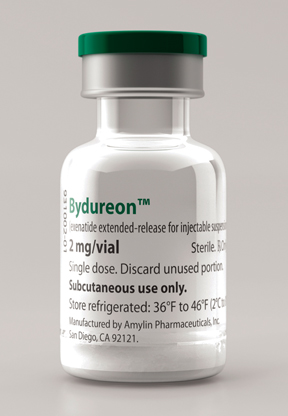For Amylin, the wait is over. The FDA has finally given the go-ahead to market its type 2 diabetes drug Bydureon, a much-needed win as Amylin tries to recover ground in the GLP-1 market.
The weekly injection is a first in the marketplace — competitor Victoza, made by Novo Nordisk, requires a once-daily dose. Amylin president and CEO Daniel Bradbury touted his drug’s positioning as the more convenient of the two drugs. Bydureon is an extended-release version of Amylin’s other GLP-1 drug, Byetta (exenatide), which is administered twice-a-day.
Deutsche Bank analysts told Reuters they expect Bydureon sales to hit $1.5 billion by 2016. The drug will reach pharmacies in February, Amylin said.
But Bydureon has been a source of handwringing for the company as well as investors. In addition to concerns that the drug interfered with the heart’s QT interval, affecting its rhythm, a 26-week trial in 2011 showed that Victoza did a better job regulating blood-glucose levels. A clinical trial in July showed the drug did not affect the QT interval.
All the while, since launching in early 2010, Victoza has been grabbing share from Byetta while expanding the GLP-1 market. Analysts projected Victoza global sales would hit $1 billion in 2011. Bydureon now owns the edge in dosing, but considering Victoza’s so well-entrenched, Amylin could face challenges on the reimbursement and formulary access front.
In a call with analysts, Amylin said the drug is priced in a manner to get Bydureon to as many people as possible: $323.44 for a one-month supply, or $4,200 a year. Victoza low- and high-doses cost about $3,400 and $5,000 per year, respectively. Byetta high dose costs about $3,500 annually, noted ISI Group analyst Mark Schoenebaum.
The Bydureon approval also marks a test of Amylin’s ability to market on its own. The San Diego, CA, company co-developed Bydureon during its 10-year partnership with Eli Lilly. But Amylin sued Lilly last year, accusing the larger company of spurning it for another marketer, Boehringer Ingelheim, after BI and Lilly struck a co-promotion deal on BI’s new DPP-IV inhibitor, Tradjenta. The Lilly-BI partnership gained a new toehold Tuesday, when the FDA approved Jentadueto, a pill that combines the main ingredient in Tradjenta (lingaliptin) with metformin. Jentadueto is taken twice a day.
As part of settling the litigation, Amylin and Lilly officially separated in November, with terms calling for Amylin to handle US marketing of Bydureon itself. Amylin said it was adding 325 reps to its diabetes sales force by March to support the rollout.
The split from Lilly also required Amylin to make a $250-million up-front payment to Lilly, as well as agreeing to give the larger company 15% of the global net sales of Bydureon and Byetta until the franchise hits $1.2 billion, plus interest. Lilly will continue to promote the two drugs outside of the US, ceding market control over the next two years, giving Amylin time to find an overseas marketing partner.
The FDA’s approval requires Amylin to conduct a clinical trial focusing on the drug’s impact on cardiovascular health by 2018.







